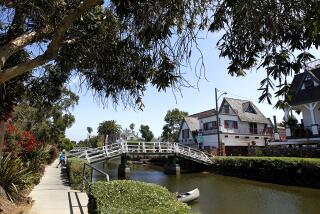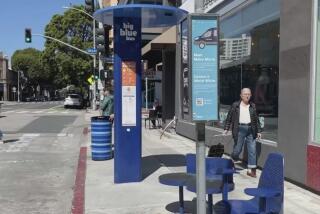Man accused in L.A., Santa Monica homeless slayings charged with additional attacks
A man suspected of killing at least four people during a spate of savage attacks on Los Angeles County’s vulnerable homeless community earlier this year was charged with four additional counts of attempted murder, a prosecutor said after a court hearing on Thursday.
Ramon Escobar, a 47-year-old Houston man, was arrested in late September and charged in a weeks-long series of assaults that left a number of homeless men beaten to death or comatose in downtown Los Angeles and Santa Monica.
The four additional attempted murders occurred during the same stretch of September when Escobar is accused of committing the other attacks. In all, Escobar is charged with four counts of murder, eight counts of attempted murder and six counts of robbery, court records show.
In an amended complaint filed by prosecutors on Thursday, Escobar was charged with attempted murder and robbery in a Sept. 11 attack on Albert Gene Scott in the 4700 block of West Slauson Avenue in Windsor Hills.
Another new attempted murder charge stemmed from an attack on Sept. 15 at the edge of MacArthur Park. The victim, Michelle Matice, was severely injured, as was Scott. Matice may have been a transient, but Scott was not homeless, said Los Angeles County Deputy Dist. Atty. Victor Avila.
On Sept. 19, four days after Matice was attacked, Escobar allegedly assaulted Kyla Renard and David Dotson in Griffith Park, leaving them severely injured, Avila said. Escobar was also charged with robbing Renard. Avila said he was not sure whether the two victims were homeless.
Prosecutors also upgraded a previous attempted murder charge against Escobar to murder. The victim, 63-year-old Jorge Martinez, was attacked on the morning of Sept. 24 in Santa Monica and died six days later.
Escobar was arrested near the scene of the attack on Martinez. In a downtown courtroom early Thursday morning, Escobar appeared in handcuffs and blue jail scrubs, sporting a thick salt-and-pepper beard. He pleaded not guilty to the charges.
According to the complaint, five of the surviving victims were left comatose because of injuries they suffered during Escobar’s attacks.
Escobar last lived in the Houston area, but police say he fled to Southern California after his aunt and uncle, Dina and Rogelio Escobar, disappeared in late August. The charred remains of Dina Escobar’s car were found on a beach in Galveston, Texas, in early September, and Houston Police have said they believe they were victims of foul play.
Investigators believe Escobar arrived in Santa Monica on Sept. 5, living out of his car for the next three weeks as he allegedly launched a series of attacks on individuals who appeared to be sleeping outside.
In each case, Escobar is accused of attacking his victims from behind while wielding either a baseball bat or a pair of bolt cutters, prosecutors said. His first two alleged victims were sleeping near the beach in Santa Monica on Sept. 8 and Sept. 10. One of them remains comatose, according to Lt. Saul Rodriguez, a Santa Monica police spokesman. It was not immediately clear if the man was expected to recover.
Six days later, Escobar is accused of using a bat to pummel three men as they slept in downtown Los Angeles’ Financial District before robbing them. Kelvin Williams, 59, and Braden Ridout, 34, died of the injuries they suffered on Sept. 16. Another man sleeping nearby, 23-year-old Tievon Harmon, 23, was critically injured, police said.
On Sept. 20, authorities said, Escobar returned to the Santa Monica area, where he is alleged to have beaten 39-year-old San Gabriel resident Steven Ray Cruze Jr. to death as he slept under the Santa Monica Pier after an overnight fishing trip. Escobar is also accused of using a pair of bolt cutters to seriously injure a man near Sawtelle and Venice boulevards on Sept. 22, police have said.
Despite fears that someone was specifically trying to hurt members of the area’s sprawling homeless population, investigators believe Escobar was targeting people who appeared to be isolated so he could rob them.
Shortly after his capture, Escobar’s immigration status became a topic of debate when U.S. Immigration and Customs Enforcement revealed that the El Salvador native had been deported from the U.S. six times from 1997 to 2011.
Escobar was arrested several times on suspicion of assault between 1992 and 2018, according to a review of state and federal court records, which showed he was most often detained on suspicion of illegally entering the U.S.
At the time of the Southern California attacks, however, Escobar had a legal right to be in the country. Records show he was granted an appeal of his deportation order in December 2016 and released from federal custody in January of last year, according to ICE.
An ICE spokeswoman could not say why Escobar’s appeal was granted. Los Angeles police previously said Escobar had been allowed to re-enter the U.S. on an asylum claim, but court records relating to asylum claims are not generally open to the public.
The Times has filed a Freedom of Information Act request with regard to Escobar’s case, but the Executive Office for Immigration Review has yet to respond.
Follow @JamesQueallyLAT for crime and police news in California.
UPDATES:
1:25 p.m.: This article was updated with additional information from the complaint.
This article was originally published at 11:35 a.m.
More to Read
Start your day right
Sign up for Essential California for news, features and recommendations from the L.A. Times and beyond in your inbox six days a week.
You may occasionally receive promotional content from the Los Angeles Times.








